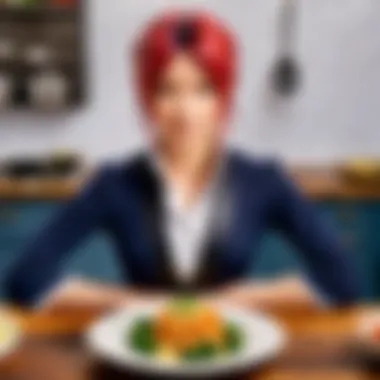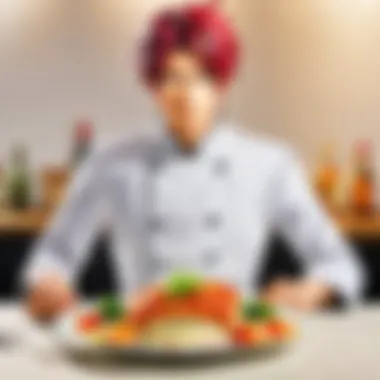Exploring Food Wars: The Third Plate's Culinary Depth


Intro
Featured Series or Manga
Overview of the Series
Food Wars (or Shokugeki no Soma), created by Yuto Tsukuda and illustrated by Shun Saeki, centers on a young and talented chef, Soma Yukihira. The third season continues to build on the narrative's foundation by diving deeper into the culinary conflicts faced by the protagonists. Each dish prepared in the series serves a higher purpose, connecting the act of cooking with intense competition among prodigies at Sōma's elite culinary school, Totsuki Culinary Academy.
Key Characters and Development
Characters in Food Wars are meticulously designed, each embodying unique attributes that enrich the narrative. Soma Yukihira stands out for his persistence and innovation. Another notable character is Erina Nakiri, known for her prestigious lineage and discerning palate. Her development prominently features in this season, challenging her preconceptions about cooking through engaging interactions with her peers and rivals.
The character dynamics evolve significantly, creating both tension and synergy, which enrich the narrative experience. Through these interactions, the audience witnesses personal growth, underscoring the importance of collaboration in a competitive landscape.
Character Analysis
Major Characters
- Soma Yukihira: The ambitious protagonist driven by his desire to surpass his father.
- Erina Nakiri: The ‘Food Diva’ grappling with her heritage and evolving as a chef.
- Megumi Tadokoro: She represents the underdog, showcasing growth from insecurity to competence.
These characters are not mere archetypes; they serve as lenses through which the series critiques traditional culinary standards.
Character Arcs and Growth
Soma illustrates relentless determination as he faces more formidable opponents. Erina’s transformation is particularly noteworthy; she learns to appreciate flavors beyond her own rigid standards. Megumi's growth, transitioning from an insecure student to a confident chef, resonates with many viewers, providing a relatable narrative of struggle and triumph. Each arc culminates in pivotal moments of self-discovery, reinforcing the theme that culinary success is intertwined with personal journey.
Thematic Exploration
Main Themes and Messages
Another theme examines class and privilege in the culinary world. The hierarchies at Totsuki serve as a microcosm for broader societal structures. The battles are not just about cooking; they reflect deeper discussions about meritocracy and psychological barriers.
Cultural Context and Influences
The series is a compelling commentary on contemporary society. The obsession with perfection in the culinary arts mirrors real-life issues faced by chefs today, balancing creativity against competitive pressures. Food Wars situates itself against this backdrop, encouraging consideration of what it means to be a ‘great chef’ in modern culture.
"Success in culinary arts is as much about personal artistry as it is about extrinsic validation."
Through this lens, Food Wars positions itself not just as entertainment but as a conversation starter, inviting audiences to reflect on the socio-cultural influences shaping their perceptions of food and success.
Prelims to Food Wars
Overview of the Franchise


Food Wars first emerged as a manga series crafted by Yuto Tsukuda, with illustrations by Shun Saeki. The narrative centers on Soma Yukihira, a passionate young chef who enters the prestigious Totsuki Culinary Academy. The franchise has garnered a dedicated following, owing to its unique blend of culinary competitions, character growth, and thematic depth. Each season, including The Third Plate, contributes to a larger narrative that explores not only the art of cooking but also personal development and the complexities of rivalry.
The anime adaptation began in 2015 and has since become a staple for anime and manga enthusiasts. Its dynamic animation and engaging storytelling have pushed it to the forefront of popular culture. As each installment brings fresh culinary battles, the stakes elevate, encouraging character development and expanding the philosophical discourse surrounding gastronomy. The franchise stands out within the vast landscape of anime due to its intricate layering of food as not just sustenance but a conduit for expression and connection.
Importance of the Third Plate
Moreover, The Third Plate introduces new characters and expands the dynamics between existing ones. The rivalries serve not only as plot devices but also as a means of showcasing culinary skills and philosophies. These interactions provide a tapestry of relationships rich in conflict and resolution, illustrating the broader implications of mentorship, innovation, and tradition in the culinary world.
"In the world of Food Wars, every dish tells a story. Each competition is not just about flavors but about the connections formed and the identities forged."
Culinary Competition and Philosophy
The idea of culinary competition goes beyond measuring skills. It allows characters to confront their failures and rise above them. This aspect resonates with many viewers who find inspiration in the challenges and triumphs experienced by the characters. The ability to innovate while adhering to traditions draws viewers into a dialogue on the nature of food itself.
The Role of Competition in Growth
Competition fosters an environment where characters must constantly push their limits. This results in development not just on a culinary level, but also on a personal one. For instance, Soma Yukihira's journey illustrates how facing rivals sharpens one’s abilities, driving innovation. Each encounter with a rival hones his skills and broadens his perspective on what food can be.
In this landscape, rivals act as catalysts for growth. They challenge beliefs about flavor and technique. The competitive atmosphere thus becomes a platform for characters to explore their potential, pushing boundaries in creativity and culinary expertise.
Culinary Techniques Explored
Fermentation Techniques
Fermentation techniques are highlighted in the battles, showcasing their role in elevating dishes to new heights. Fermentation offers a unique aspect of flavor development that is essential in modern gastronomy. This technique can enhance taste profiles dramatically, introducing complexity that can transform a dish.
Key to fermentation is the control of time and environmental conditions, which allows for the growth of beneficial microorganisms. This controlled process not only improves the flavor but can also elevate the nutritional profile of food. In Food Wars, characters often harness fermentation to create dishes that not only impress judges but also tell a story of patience and skill. However, reliance on this technique requires a deep understanding of its science. Mismanagement can lead to undesirable results, which can be a critical aspect during culinary competitions.
Emphasis on Local Ingredients
Local ingredients often carry a story and a connection to the community. This creates a richer experience for diners and brings depth to the dishes prepared. However, it also poses challenges, such as seasonal limitations and availability. Characters often face the pressure of producing exceptional dishes with whatever local sources are at hand, increasing the stakes in culinary battles.
Traditional vs. Modern Methods
The discussion of traditional versus modern methods is essential in the series. This topic opens a dialogue about the evolution of culinary practices and how innovation can coexist with tradition. Traditional methods often emphasize time-honored techniques passed down through generations. These methods are revered for their ability to create authentic flavors that embody cultural heritage.
On the other hand, modern methods prioritize science and technology. They introduce new techniques and tools that can change the culinary landscape quickly and dramatically. Food Wars showcases how characters blend the two, utilizing the wisdom of traditional techniques while incorporating modern innovations to create dishes that challenge expectations.
The debate continues to hold significant meaning in the series, reflecting broader conversations about culinary identity in today's society. It encourages a re-evaluation of how methods shape flavors and experiences in gastronomy.
"Culinary battles in Food Wars push characters to explore the very essence of their cooking, combining tradition with innovation."
Character Development in The Third Plate
Evolution of Soma Yukihira


Soma Yukihira undergoes significant transformation during this season. Initially seen as a somewhat carefree student, he develops depth through intense challenges. His encounters with formidable rivals compel him to refine his skills. This evolution is marked by a stronger commitment to culinary excellence. Each battle presents lessons that shape his philosophy about food and competition. The audience witnesses a shift from a naive enthusiasm to a matured sense of purpose. This change is vital, as it highlights the challenges that come with ambition.
Impact of Rivalries
Significance of Nakiri Erina
The character of Nakiri Erina stands as a key figure in reinforcing Soma's development. Her presence challenges him intellectually and emotionally. Erina’s well-known culinary pedigree contrasts with Soma's more instinctual approach. This relationship enhances the narrative by showcasing how opposing styles can lead to growth. Nakiri embodies fearsome talent coupled with deep-rooted insecurity.
- Her main characteristic is an unwavering commitment to culinary standards. This characteristic often leads Soma to question his techniques, pushing him to improve.
- A unique feature of her character is her infamous family reputation. This adds pressure on her, making her journey relatable. This duality helps her stand as a well-rounded character in the series.
Character Dynamics with Megumi
The interaction between Soma and Megumi is equally important. Their chemistry brings a balance of support and competition. Megumi often represents the emotional anchor in Soma’s journey. They share mutual respect, enhancing their individual growth arcs. This dynamic illustrates a balance between teamwork and rivalry, crucial for overcoming challenges.
- A key characteristic of their relationship is how they continually push each other to reach new heights. This not only solidifies their friendship but also their culinary skills.
- The unique layer of their interaction is their contrasting personalities, which provide various perspectives on challenges in the culinary world. This feature emphasizes the importance of collaboration.
Exploration of Supporting Characters
Supporting characters add depth to the narrative by showcasing varied experiences and backgrounds. They each contribute unique perspectives, enriching the storyline. This exploration is valuable, as it reflects society’s diversity within culinary arts.
- The key characteristic of supporting characters lies in their various culinary philosophies. These philosophies either clash or align with Soma's, affecting his growth.
- Their unique feature comes from their individual backstories. Each character brings challenges that help Soma learn valuable lessons, further enhancing his character arc.
Thematic Elements of The Third Plate
Food as a Means of Connection
"Food brings us together and reveals who we are. It’s our stories, our history, and our love on a plate."
This thematic exploration extends beyond the characters to the audience, inviting them to engage in personal reflection about their relationships and how they relate to the communal aspect of culinary activities.
Confronting Tradition vs. Innovation
Another critical theme within "The Third Plate" is the ongoing struggle between tradition and innovation. Characters such as Soma Yukihira represent the newer generation of chefs who aim to redefine culinary norms through creativity and modern techniques. In stark contrast, other characters, like Nakiri Erina, embody traditional culinary values, emphasizing the knowledge and respect for classic methods. This dichotomy of ideology fosters rich dialogues and rivalries, pushing each character to grow and adapt.
The tension between these approaches is particularly evident in various culinary battles where the stakes are high. It arises not only in their culinary creations but also in their personal philosophies. Viewers are prompted to consider the importance of respecting tradition while being open to innovative methods. The series thus creates a nuanced exploration of how culinary identity can evolve without losing its core essence.
Impact of Mentorship
Mentorship plays a pivotal role in shaping the characters within "The Third Plate". The series illustrates how various mentors guide their students, enhancing their skills and perspectives. Figures like Joichiro Yukihira provide essential frameworks for Soma, encouraging him to push beyond his limits. This mentorship is not limited to technical skills; it also instills core values such as resilience, creativity, and the importance of culinary legacy.
The relationship dynamics among mentors and their mentees facilitate significant character development. For example, Soma’s growth is profoundly influenced by his interactions with seasoned chefs, which shape not only his culinary approach but also his character as a whole. Moreover, the depiction of mentorship encourages viewers to value guidance and wisdom from previous generations, reinforcing the significance of passing down expertise in any craft.
Culinary Battles: A Closer Look


In these intense rivalries, each dish crafted holds significance beyond taste. They serve as reflections of individual cooking styles and the characters' emotional journeys. The audience follows Soma Yukihira and his peers, absorbing their innovations and techniques. Furthermore, each battle is layered with tension and artistry, drawing viewers into the high-stakes world of culinary excellence.
Signature Dishes and Their Significance
The impact of a well-prepared dish affects not only the judges but also the competitors, as they face each other in culinary combat. This reflection on personal history and technique elevates the significance of the dishes beyond mere gastronomical competition. Each dish, carefully presented, symbolizes the unique styles and philosophies of its creator.
Judging Criteria and Its Evolution
The judging criteria in the culinary battles evolve through the seasons, revealing a more nuanced understanding of what constitutes excellent cooking. Initially based on fundamental elements like taste and presentation, the criteria in "The Third Plate" shift towards a more holistic approach. Judges begin to consider the emotional impact and the stories behind the dishes.
This evolution highlights a broader commentary on culinary arts, suggesting that the heart and soul poured into cooking can be as important as the technical skills displayed. As the series progresses, viewers can see how character development influences these criteria, reflecting their growth and understanding of what food can represent.
Cultural References in Culinary Battles
Cultural references abound within the culinary battles, enhancing the narrative and deepening the audience's connection to the food showcased. These references are more than just backdrop; they offer insights into Japan's culinary heritage and societal values.
Through these battles, traditions and modern cooking techniques come together. For example, a dish may integrate traditional Japanese flavors with contemporary techniques, demonstrating an evolution of cuisine. Additionally, the varied backgrounds of each character introduce viewers to different aspects of culinary culture, showing how food is a universal language.
"Food becomes a narrative, a way of understanding the world, reflecting not only personal desires but also cultural identity."
Audience Reception and Critique
Critical Acclaim and Audience Feedback
According to various reviews, the intricate portrayal of gastronomy sets this season apart. It captures the process and philosophy behind food in a manner that emphasizes both challenge and creativity. Many viewers have connected with the themes of rivalry and mentorship depicted in the storyline. For example, the relationship between Soma and his peers exemplifies growth driven by competition.
Audience feedback on platforms like Reddit shows that fans felt a stronger emotional tie to the characters this season. Viewers expressed their sentiment about the evolution of Nakiri Erina and the development of supporting characters, noting how these arcs added richness to the overall narrative. The discussions often reflect a sense of investment in the characters' journeys, revealing why this season resonates with many.
"The depth in food preparation and the emotional stakes make this season one of the best. It’s not just about cooking; it’s about connection and growth."
— An enthusiastic fan review
Comparative Analysis with Previous Seasons
When comparing The Third Plate to its predecessors, distinct differences emerge in both tone and execution. While earlier seasons focused heavily on the foundation of culinary battles, the current installment leans more on character exploration and thematic depth. The narrative showcases a maturity that builds on previous experiences and challenges faced by the characters.
A few significant points of comparison include:
- Character Focus: In earlier seasons, the emphasis was more on introducing characters and their abilities. This season dives deeper into their relationships and individual challenges.
- Culinary Philosophy: Previous seasons highlighted culinary techniques. The Third Plate expands on this by embedding philosophical questions about tradition versus innovation in their battles.
- Judging Dynamics: The criteria and the stakes attached to culinary battles have evolved. The focus now includes emotional elements along with technical skills, marking a shift in how achievements are measured in the series.
The Legacy of Food Wars
The legacy of Food Wars is multifaceted and profound, extending far beyond mere entertainment. The show has established a significant cultural imprint through its blend of culinary artistry and personal growth. It serves as a benchmark for discussing culinary competition and the philosophies underpinning gastronomy.
Culinary Influence on Contemporary Culture
Food Wars contributes to contemporary culture by emphasizing the role of food as a unifying force. It foregrounds the importance of creativity in cooking, encouraging viewers to appreciate culinary innovation. This series not only showcases traditional cooking techniques but also challenges conventions through modern interpretations. The dialogue surrounding food has evolved, largely influenced by the narratives and values espoused in this anime.
Moreover, the show highlights the impact of food sustainability and regional cuisine, igniting discussions around these pivotal topics. As characters advocate for local ingredients and sustainable practices, viewers are prompted to reflect on their own culinary choices.
Impact on the Anime Genre
The success of Food Wars has reverberated throughout the anime community, influencing other series and potentially shifting genre trends. Unlike typical shonen narratives focused solely on action, Food Wars merges food-related themes with character development and emotional depth. This approach has inspired other animators to explore diverse narratives that incorporate food, culture, and personal struggle. It demonstrates that food-centric plots can engage audiences while delivering compelling storytelling.
Furthermore, the incorporation of food battles as a central plot device has opened avenues for more imaginative storytelling techniques, adding layers of complexity to character interactions.
Future Prospects for the Franchise
While Food Wars has already left an indelible mark, its future appears promising. There are discussions surrounding potential spin-offs or adaptations that might extend its universe. The engaging characters and intricate culinary battles could lend themselves well to broader storytelling narratives, such as exploring global cuisines or focusing on the experiences of secondary characters.
The fanbase remains formidable and enthusiastic, indicating substantial demand for further content. Interest in culinary arts continues to grow globally, offering fertile ground for Food Wars to build upon its legacy.
"The exploration of food in Food Wars not only entertains but also educates, enlightening viewers about the cultural dimensions of cuisine."
In summation, the legacy of Food Wars is profound, affecting not only culinary discourse but also the anime landscape. It beckons viewers to delve deeper into gastronomy while celebrating the interconnectedness of culture through food.



